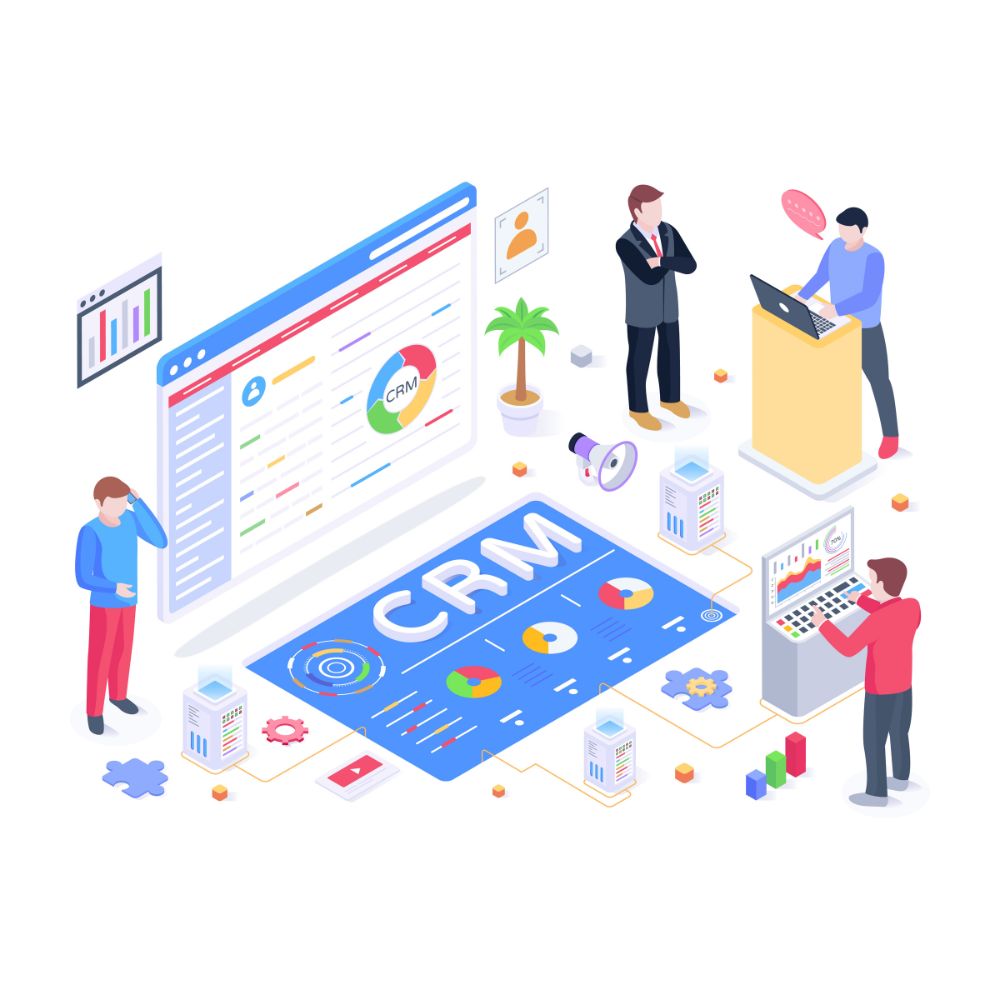Have you ever wondered what the difference is between a Customer Data Platform (CDP) and a Customer Relationship Management System (CRM)? While both systems can help you collect and analyze customer data, they have different approaches and features that make them suited to different types of businesses. In this blog post, we will compare and contrast the two systems so that you can make an informed decision about which system is right for your business.
What is a Customer Data Platform?
AA customer data platform (CDP) is a system designed to help businesses collect, store, and use their customer data to gain a better understanding of their customers. Unlike Customer Relationship Management (CRM) systems, CDPs bring together data from different sources to give a single view of each customer, allowing for tailored marketing tactics. CDPs are also designed to be easy to deploy and use, while also providing cutting-edge features like segmentation and automated customer journeys. Furthermore, CDPs provide more insights than CRMs as they aggregate more data points such as behavioral data and cross-channel data, giving businesses a bigger picture of their customers. Ultimately, CDPs are the ideal choice for businesses looking to make the most out of their customer data.
With a CDP, businesses can access their customer data from multiple sources, integrate it into one platform, and use it to create more customized experiences for their customers – all while maintaining a secure environment for the data Thus, a customer data platform is a significant innovation from traditional customer relationship management (CRM) software. It enables businesses to collect and integrate data from multiple sources in one secure environment. This, in turn, provides businesses with the opportunity to create personalized experiences for their customers. The ultimate goal is to build stronger relationships that result in customer loyalty and satisfaction.
What is a Customer Relationship Management System?
A Customer Relationship Management (CRM) system is a software platform that enables organizations to manage customer relationships in a single unified platform, typically providing capabilities such as automated lead management, contact management, customer segmentation, customer analytics, and marketing automation. However, a Customer Data Platform (CDP) is a centralized system that aggregates customer data from multiple touchpoints and sources, providing a single source of truth for customer data. In contrast to CRM software, CDPs are designed to pull in customer data from disparate sources such as website visits, mobile app usage information, marketing campaigns, and online purchases. This allows for more comprehensive profiles, customized segmentation for one-to-one marketing campaigns, and advanced analytics to help organizations better understand their customers and deliver personalized experiences.
CRMs help businesses better understand their customers’ needs and preferences by collecting data from multiple sources and providing insights into how to better serve them, allowing for improved customer service and increased sales However, customer relationship management is designed to help customer-facing teams specifically focus on customer relationships, while customer data platforms are built to store, organize and analyze customer data from all customer interaction channels, such as website activity and customer service interactions. Both CRMs and CDPs are essential for successful customer engagement strategies, but they both have unique roles in businesses of different sizes.
Features and Benefits of a Customer Data Platform
A Customer Data Platform (CDP) offers a comprehensive solution to unify customer data from multiple systems and channels, providing businesses with a single source of truth when it comes to their customers. This is a stark contrast to a Customer Relationship Management (CRM) system which is only able to capture data from interactions within the specific platform. A CDP can bring all the customer data from multiple sources together, allowing businesses to gain full visibility and insights into their customers as individuals. By unifying customer data, CDPs provide a 360-degree view of each individual customer, enabling more informed decision making across the organization.
By combining all of this data in one place, a CDP enhances the ability to analyze customer behaviors, create personalized experiences, and deliver more accurate insights into what products or services will be most successful Moreover, a Customer Data Platform (CDP) offers many advantages over a traditional Customer Relationship Management (CRM) system. By collecting data from all available sources including website interactions, social media engagement, and customer purchase behavior, CDPs help business gain an integrated view of their customers. By combining all of this data in one place, a CDP enhances the ability to analyze customer behaviors, create personalized experiences, and deliver more accurate insights into what products or services will be most successful. Ultimately, CDPs offer a more comprehensive approach to understanding customer needs and preferences than any other system.
Features and Benefits of a Customer Relationship Management System
A Customer Relationship Management (CRM) system offers extensive features that help to streamline customer interactions, from tracking data and analyzing customer trends, to automating communication and sales processes. It enables customer relationship professionals to more easily track customer history and identify customer trends. A Customer Data Platform (CDP), on the other hand, offers an even more comprehensive customer experience. CDPs are a type of customer relationship management system that is specifically designed to capture and manage customer data, including customer interactions across multiple touchpoints and channels. This data can then be used to develop customer-centric strategies tailored to customer preferences, behavior, and interests. Additionally, CDPs provide marketers with customer insights at the individual level for improved customer segmentation and targeted campaigns.
With a CRM system, businesses can easily create personalized customer experiences by integrating customer data across all touchpoints in the customer journey. This allows businesses to make more informed decisions about their customers and drive more sales from their interactions. A customer data platform (CDP) is a comprehensive customer database that allows businesses to store customer data in one place. This enables them to have an in-depth view of customer behavior and make more effective decisions. CDPs also provide customer segmentation capabilities, allowing businesses to identify customer segments, create custom marketing campaigns and measure customer engagement levels. The key difference between customer data platform and customer relationship management is that CDPs provide a single source of customer data, whereas CRM systems focus on managing customer relationships. CDPs are useful for businesses looking for a comprehensive view of customer behavior and a more efficient way to manage customer data across all touchpoints.
Additionally, leveraging a CRM system helps companies boost efficiency with automated tasks such as lead management, contact management, and workflow tracking. This makes it easier for businesses to keep up with their customers’ ever-evolving needs in the digital age Finally, customer data platforms and customer relationship management tools are both essential for customer-focused businesses. CDPs are powerful data-driven tools that can unlock customer insights, allowing companies to personalize customer experiences in a more effective way. On the other hand, CRM systems help streamline customer relationships by providing an efficient platform for lead management, contact management and workflow tracking -all of which are critical for customer engagement in the digital age.
Additionally, leveraging a CRM system helps companies boost efficiency with automated tasks such as lead management, contact management, and workflow tracking. This makes it easier for businesses to keep up with their customers’ ever-evolving needs in the digital age Finally, customer data platforms and customer relationship management tools are both essential for customer-focused businesses. CDPs are powerful data-driven tools that can unlock customer insights, allowing companies to personalize customer experiences in a more effective way. On the other hand, CRM systems help streamline customer relationships by providing an efficient platform for lead management, contact management and workflow tracking -all of which are critical for customer engagement in the digital age.
Comparing the Advantages of CDPs and CRMs
A customer data platform (CDP) offers a comprehensive customer view by bringing together data from various sources and creating a single source of truth for customer data, making it easier for businesses to understand their customers’ behavior. CDPs are different from Customer Relationship Management (CRM) systems in that CDPs are designed to collect and manage customer data from multiple sources, while CRMs focus on managing customer interactions. CDPs can also be used to create personalized customer experiences that reflect the customer’s journey, by activating data from various sources. As such, CDPs are invaluable for organizations looking to build deeper relationships with their customers, while also maximizing the value they get from their customer data.
Conversely, Customer Relationship Management (CRM) systems mainly focus on managing relationships for existing customers, allowing companies to access customer contact information, track sales leads and set milestones Moreover, Customer Data Platforms are great for acquiring new customers and accurately identifying them, while Customer Relationship Management systems mainly focus on managing relationships with existing customers. They provide companies with access to customer contact information, track sales leads and set milestones. Knowing the distinction between these two powerful tools is key to creating a successful marketing strategy that can drive customer engagement and loyalty.
Which System is Better for Your Business?
When considering which system is better for your business, it’s important to understand the primary differences between customer data platform (CDP) and customer relationship management (CRM) systems. A CDP captures all of an individual customer’s data in one place, while a CRM focuses on managing customer interactions and relationships. A CDP typically provides customer data across multiple sources, while a CRM is often limited to customer data that is entered manually. CDP systems provide dynamic customer segmentation capabilities, including dynamic audience creation and customer insights. In contrast, customer relationship management systems provide customer engagement features such as automated customer email campaigns, customer surveys and customer service support. CDPs allow marketers to easily access customer data and take actions in real-time, while customer relationship management systems can take longer to implement changes. Ultimately, when selecting the right system for your business needs, it’s important to consider both the customer data platform and customer relationship management functionalities.
While both systems provide valuable insight into customers, a CDP offers more detailed analytics and provides a holistic view of a customer’s entire journey, while a CRM helps identify opportunities to interact with customers by tracking sales, marketing campaigns, and other customer activities. Ultimately, the right system for your business will depend on your unique needs and business goals Also, customer relationship management (CMR) focuses on customer interactions and customer information related to sales and marketing activities. It is a great tool for customer segmentation and customer engagement. In contrast, a customer data platform (CDP) is a unified customer database that collects customer data from multiple sources across all channels to provide actionable insights. A CDP has the capability to provide the most detailed customer insights available, offering a 360- degree view of customer behavior. Ultimately, it will depend on your business needs and goals as to which system best suits your requirements.
The main takeaway from this comparison is that while both a Customer Data Platform and a Customer Relationship Management System can help you collect and analyze customer data, they are tailored to different needs. A CDP is designed for businesses that need to collect and store customer data in one place, whereas a CRM is better for businesses that need a comprehensive system for managing customer relationships. Depending on your specific business needs, one of the two systems may be better suited to your organization than the other.




